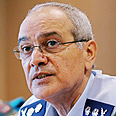
Army chief slams radical settlers
Chief-of-Staff Dan Halutz also criticizes law enforcement agencies, says turning blind eye to violent settlers could 'lead us to places we don’t want to reach. In other countries they call it anarchy'
Speaking at a national security conference at Haifa University Tuesday evening, Halutz addressed attempted by Jews to resettle in the evacuated northern West Bank settlement of Sa-Nur and presented the dilemmas faced by the army.
"The army's job is not policing. That's what state authorities are tasked with," he said. "Turning a blind eye can lead us to places we don't want to reach. In other countries they would call it anarchy."
"Last week we had to drive several girls in a military truck," the army chief told the audience. "When we removed them from the truck, we discovered they damaged and ripped all the seats and inscribed the slogan 'Long live the State of Judea, may the State of Israel be ruined' on the walls."
"The army will do all it can to combat the phenomenon, but the army is not the State of Israel's police force," Halutz said. "We have a police and we have law enforcement bodies. Their job is to deal with the phenomenon."
Turning his attention to Iran's efforts to develop nuclear arms, Halutz characterized the Islamic republic as "the sole existential threat" faced by Israel today.
"Iran strives to arm itself with non-conventional weapons and its leaders are also non-conventional", the army chief said. "They threaten to erase the State of Israel and are trying to find a weapon that can do that. Once they possess such arms, the temptation to use it may be too big to resist."
"We saw that countries are led by regular political leaders, the possession of nuclear weapons does not lead to using it," he said. "We saw it working in Europe for dozens of years."
However, Halutz said there is still sufficient time to act against the threat, stressing the international community should be doing so.
"This doesn't have to be done by the State of Israel, although Israel faces an immediate threat," he said.
'Strategic situation better than ever'
Referring to the situation in the Palestinian Authority, Halutz said that "in 10 days, after the elections, we will know where the PA is headed."
He noted that the democratic process the Palestinians are facing embodies more opportunities than risks.
"There is always the risk that a non-democratic group will take over the system through undemocratic means. On the other hand, a democratic process is a restraining process. If a certain group claims responsibility, it is a restraining factor," he said.
Halutz also referred to the defense budget, slamming "economists who claim that cuts to (the budget) are the solution for all of Israel's economic maladies."
"The military force is the tax, the municipal tax that the State of Israel must pay in order for us to continue living safely in this 'neighborhood,' the Middle East," he said.
"The defense budget, even if it is reduced in accordance with the drop in the risk level, will never be annulled. Israel will be committed to maintaining a military force even if and when peace and serenity prevail in the region," he added.
Halutz also noted the economy and security in Israel go hand in hand, considering the fact that 16 percent of Israel's production and exports are related to the defense establishment, and that the IDF is the State's biggest socioeconomic organization.
The chief of staff also referred to the need for "mental strength," and not necessarily military strength, as part of the components of national security. He then praised Israelis, "who proved that they have great mental strength, which is realized in the ability to absorb, to recover, to get up and to move on."
Halutz concluded that "our strategic situation is better than it ever was in all the power components – the physical, the economic and the social – compared to all the countries surrounding us."










